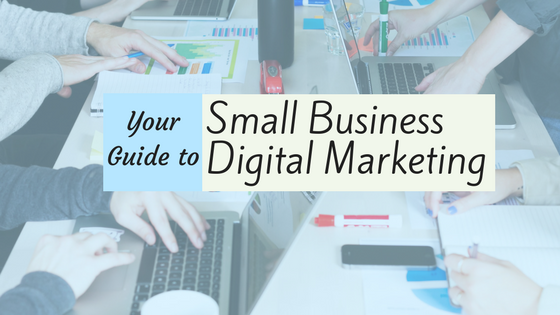Your Guide to Small Business Digital Marketing
Digital marketing has done a lot to level the playing field for small businesses. Thanks to the Internet, you can reach as many local, national, and international leads and customers as even the largest corporation in your field. That said, without the right digital marketing strategy, you really won’t be doing your business any favors.
Lack of Strategy Leads to Wasted Resources
Without a solid marketing strategy, it can be easy to get distracted by every opportunity and every new platform. This is a great way to waste a lot of time and resources with website redesigns and launches, spam email campaigns that do nothing but annoy your potential customers, and lots of wasted time chasing after “The Next Big Thing” in social media.
For example, just last year, a new social media platform came on the scene that was supposed to be the end of Facebook and other networks like it. For about a week, millennials, businesspeople, and everyone you knew online were clamoring to get on the list or get an invite so that they could join Ello.co…
A week or two after that, everyone who had flocked to Ello was back on Facebook, Twitter, Instagram, and Snapchat. Do you know anyone hanging out on Ello today? Have you even thought about the supposed “Next Big Thing” in social media in the past year? Or were you, like a lot of others, one of the ones who completely missed all of the hype in the first place?
While the Ello example is a bit extreme, and you don’t see new social media platforms rising and falling every day, it is a good illustration of why small businesses need solid digital marketing strategies to be competitive. If you don’t have a plan, then you are more likely to jump on every digital bandwagon that comes along.
Some campaigns and platforms will be successful, but others will be a waste of time. Without the structure and strategy of a marketing plan, you won’t know which is which and you’ll be drowning in a ton of marketing and advertising efforts without any real clue as to which ones are good for business, redundant, conflicting with each other, and/or actually hurting your marketing efforts.
Creating an Effective Digital Marketing Plan
So how do you create a small business digital marketing strategy that will work for you? Honestly, the best way to create a really solid marketing plan is to hire qualified professionals, like our team at Gauge Digital Media, who’ve devoted their careers to understanding the world of digital marketing.
To get a better understanding of how we do our jobs, though, you should understand that every good digital marketing strategy is based on a lot of statistical analysis. Marketing professionals create effective digital marketing plans and strategies for small businesses by looking at the way people use the Internet and how user patterns and habits can help or hurt small businesses.
The best small business digital marketing strategies focus on more than just advertising to your target audience. They take into account your web design, how your audience views your content, what kind of content they respond best to, where they spend time online, and other factors, too. It’s a holistic process, and all of the components of a good digital marketing plan work together to create successful campaigns and more sales for your business.
Social Media Is a Huge Influencer
If your business is online, then it needs to be on social media, as well. But, why? Why is social media marketing such a huge focus for businesses right now? Simply put, social media is a huge influence on consumers. According to recent research, over a third of consumer decisions to purchase items are influenced by social media.
If your competition is on social media (and they are), then you can guarantee that they are working to influence shoppers to buy their products and/or services over yours. Effective social media marketing generates leads and draws traffic to your website. With quality social media content on the right platforms, you can notice a major improvement in exposure and lead generation.
You Can’t Ignore Mobile
With that in mind, it’s important to note that recent studies have also shown that a full 35% of all online traffic in the United States is now mobile. People are using their phones, tablets, smart watches, and other mobile devices to browse websites, keep up with social media, check email, and shop online while they’re on the go.
That means over a third of your traffic is coming from mobile devices, which means that you absolutely cannot ignore mobile technology when designing your website and creating email marketing campaigns. No matter how effective your social media marketing campaigns may be, if they point toward a website that doesn’t have a responsive, mobile-friendly design, you’re not going to see more conversions. In fact, your leads are more likely to seek out your competition to find the products or services they’re looking for.
Content Really Is King
Now, having presences on the right social media platforms and designing an attractive, mobile-friendly site will get you started in the world of digital marketing. However, these are only the beginning steps. If you don’t have quality content that your target audience wants to see and read, then you aren’t going to see any real results from your marketing efforts.
Why is content king? First of all, creating a steady flow of new, fresh content for your website and social media platforms will improve your ranks on Google and Bing’s SERPs (search engine results pages). The higher in the rankings your site is, the more likely viewers will be to click on it than others.
Creating quality content gives you the opportunity to sprinkle relevant keywords and phrases throughout your site and social media accounts without keyword stuffing. Google and Bing are both cracking down on sites that sacrifice quality for SERP rankings, but if you focus on creating a site and content that your target audience will want to see, then you will continue to rise in the ranks.
Working on SEO (search engine optimization) this way instead of attempting to cheat the system with fake back links, keyword stuffing, and other questionable techniques will also raise your credibility with your customers, as well as Google. Remember, in the end, you’re creating content because you want to draw people in and convert leads to sales. Improving your SEO is a means toward this end, not the end in and of itself.
Pay Attention to Analytics
As we’ve mentioned, statistical data is key to figuring out where and how you need to focus your digital marketing habits. However, this should not be based solely on generic market data. Instead, it should be an ongoing process of monitoring the analytics of your site and your social media presences. This data gives you the raw information you need to figure out which campaigns are working and which are not, as well as how to tweak your marketing strategy to better reach your audience.
Interested in more information on effective web design and digital marketing for your small business? Call Gauge Digital Media today at 410-376-7709 or fill out our convenient online contact form. Let’s talk about digital marketing and design!







